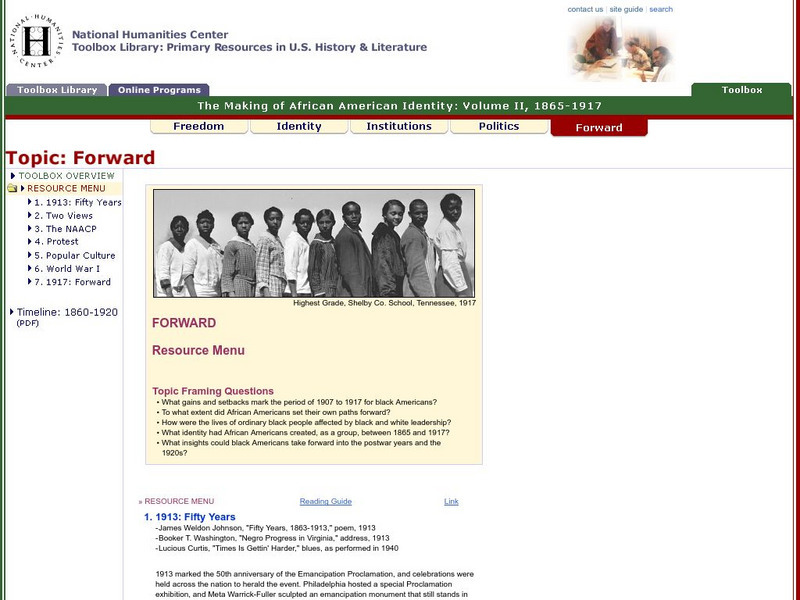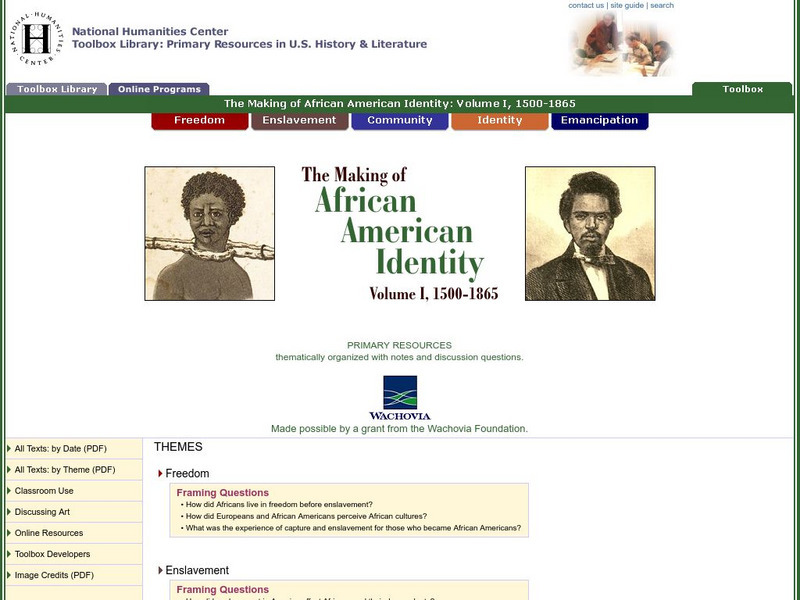Hi, what do you want to do?
Curated OER
Create a Magic Lantern Show; Freed People in the Reconstruction South
Engage your scholars by having them create "magic lantern shows" inspired by the film Dr. Toer's Amazing Magic Lantern Show: A Different View of Emancipation. As they study the South's Reconstruction through primary...
Curated OER
Who Freed the Slaves During the Civil War?
Pose the question to your historians: who really freed the slaves? They critically assess various arguments, using primary sources as evidence. In small groups, scholars jigsaw 5 primary source documents (linked), and fill out an...
Curated OER
Lincoln, Emancipation, and the Constitution
Students determine how President Lincoln promoted emancipation. In this slavery lesson plan, students examine primary documents, including the U.S. Constitution, to reconstruct Lincoln's attempts to end slavery and deliver the...
Curated OER
African Americans in the Civil War
Students examine the contributions of African American soldiers during the Civil War. In pairs, they complete Civil War timeline worksheets. They use character cards to assume the identities of African Americans and determine whether or...
Curated OER
Meet Hannah the Weaver
Young scholars analyze primary and secondary sources to explore slavery and emancipation, and write letter or diary entry from point of view of slave Hannah Harris or plantation owner Robert Carter. Students then dramatize their creative...
Curated OER
The Civil War (1861-1865) Through Maps, Charts, Graphs, & Pictures
True to its titles, this engaging and appealing presentation brings the 1860's into close focus with a number of images and statistics that would delight any Civil War buff. A few graphs allow for pupil input, such as listing the...
Curated OER
The Antebellum South
Your history students will be on the edges of their seats during this fascinating presentation, which details the abolition movement and slave life during the Antebellum period in the American South. Students will be left agape at the...
Curated OER
Reconstruction (1865-1876)
Easily broken into pieces for several class sessions, this presentation is a great way to transition your class out of a Civil War unit and closer to the 20th century. Engaging photographs, including relevant maps and humorous political...
Curated OER
Rights and Responsibilities, Is It Breaking the Law?
Students investigate the life and trial of Rev. John Mahan who was involved with the illegal Underground Railroad. The issue of breaking the law to help slaves escape is examined in this lesson.
Curated OER
Civil War Research Project
Give your WWI study collaborative energy using a group research project. Groups are assigned one of the six main themes (included). Each group has an outline to guide research but will need an assignment guide. Consider supplementing the...
Curated OER
The age of majority: How old is old enough?
Students research on the Web and in books the "age of majority" in general and how it applies in their particular states. Explore, too, "emancipation" and whether this is another way for teens to earn additional rights. Students write a...
Curated OER
The Brief American Pageant: The Furnace of the Civil War
The eyes of an American History teacher (or Civil War buff) will open wide with this series of maps, which detail the campaigns and battles of the Civil War. Meant to supplement chapter 21 of The American Pageant, this presentation would...
Curated OER
Civil Rights/Segregation
Sixth graders investigate Civil Rights by participating in role-playing activities. In this U.S. History lesson, 6th graders research the history of slavery in order to portray a story through their debating and acting...
Curated OER
Freedom for All? The Contradictions of Slavery and Freedom in the Maryland
Students are be able to analyze the contrast between the rights and privileges referenced in the Declaration of Independence and the Maryland State Constitution in comparison to the rights and privileges of slaves. They are be able to...
Curated OER
Attitudes Toward Emancipation
Students evaluate the provisions of the Emancipation Proclamation. They trace the stages that led to Lincoln's formulation of this policy. Explore the range of contemporary public opinion on the issue of emancipation.
Curated OER
Afro-Caribbean Americans and the Sugar Economy
Learners read the narrative, Caribbean Immigration and examine how sugar production and migration of people of African origin have been intertwined for centuries. Working in three groups, they present oral reports on the three eras of...
Curated OER
Black Americans in Delaware from 1639 to the Present: An Overview
Pupils complete matching activities and write an essay about Black Americans in Delaware from 1639.
National Humanities Center
National Humanities Center: Toolbox Library: Identity, Making of African American Identity: V. 2, 1865 1917
Sixteen primary sources-historical documents, literary texts, visual images, audio, and video material-that explore how African Americans created group and individual identities in the late-nineteenth century.
National Humanities Center
National Humanities Center: Toolbox Library: Forward, Making of African American Identity: V. 2, 1865 1917
Sixteen texts-historical documents, literary texts, visual images, audio, and video material-that explore the political, social, and cultural state of African Americans at the beginning of the twentieth century.
National Humanities Center
National Humanities Center: Toolbox Library: Making of African American Identity: V. 1, 1500 1865
One hundred and sixty primary sources-historical documents, literary texts, and visual images-that explore the conditions of slavery, the search for identity, the development of a sense of community while enslaved, and the struggles for...
Library of Congress
Loc: African Immigration: Africans in America: Life in a Slave Society
An excellent overview of the African American experience in America beginning with West Africa during the slave trade, through emancipation and reconstruction, to "New beginnings."
Digital History
Digital History: America's Reconstruction
An overview of Reconstruction provided by the University of Houston. Provides images and the political climate that occurred during this part of American History.
National Endowment for the Humanities
Neh: Edsit Ement: The Emancipation Proclamation: Freedom's First Steps
By reading and studying a variety of written resources--the Emancipation Proclamation and newspaper archives--high school students explore the steps Lincoln took towards emancipating the slaves and freed slaves' reaction to the...
Library of Congress
Loc: Learning Page: The Freedmen
This resource provides information about the Freedmen, who were free after the Emancipation of Slaves.




























